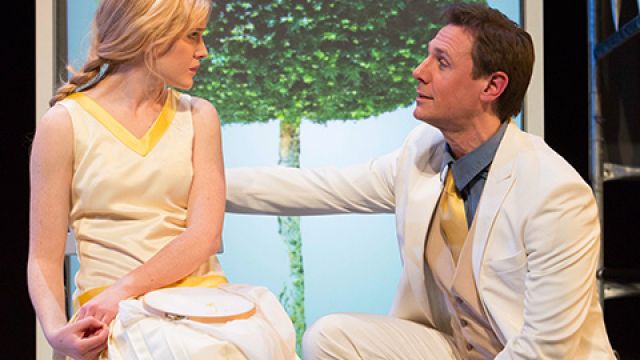The School for Wives
Some plays tickle you with their physical antics; others, with the consequences of terrible judgement; others again, with a sequence of believable misunderstandings and conflicts. But this staging of Molière's School for Wives is so full of rich, delicious fun—character defects and foibles, webs of deceit, brilliant use of set design and props, language jokes, even the on-stage musician's interactions with the players—that it's hard to pinpoint a single reason for guffawing so much. In a strange twist of oversight, comedies tend not to be regarded as serious theatre in the sense of offering insight into what it is to be human.
As is so often the case, the common dogma is simply and demonstrably wrong: look at the power of the comedies of Voltaire and of Shakespeare to shed light on the human condition.
The present translation of Molière's comic take on what was recently known as the battle of the sexes is nothing less than inspired in its power to reveal us to ourselves candidly. Director Lee Lewis's staging of it is as creative as Molière's writing and Justin Fleming's translation and adaption, and the integration of the whole must be seen, at least once, to be believed. Even the delightful live musical accompaniment is integrated into the play, and the dialogue is lush with odd references to popular culture that enrich the play's cultural richness. Fleming and Lewis have been masterful in setting the tale in 1920s Paris; and Bell's accomplished players perform it exquisitely. If I single out Andrew Johnston's Fawlty Towers–Manuelesque character Alan; Harriet Dyer's utterly believable guilelessness as Agnes; or Jonathan Elsom's very distinct characters of Henri and a notary (as well as a waiter of prodigious dexterity) for mention as especially dear, it's not because the others were any lesser actors. Every performance was a treat in credibility.
If you see any play twice this year, make it this one. I could have turned around and watched it again on the same evening. Yes, it's that good.
—John P. Harvey
Image: Harriet Dwyer and John Adam, in The School for Wives. Photographer: Brett Boardman.
Subscribe to our E-Newsletter, buy our latest print edition or find a Performing Arts book at Book Nook.

